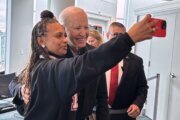WASHINGTON — Could Maryland residents be taxed for each mile they drive? It’s something lawmakers want to study, but the state’s gubernatorial candidates and transportation experts don’t like the idea.
Under a “Vehicle Miles Travelled” tax, drivers would be required to report their mileage to the government — possibly through a GPS tracker. Then drivers would be charged a fee per mile.
“This is something that drivers ought to be concerned about,” says Ron Ely, chairman of the Maryland Drivers Alliance. “If such a plan is actually implemented, you’ll end up paying a lot more. Even if they set a relatively low rate per mile, you’d still be looking at a sizable chunk taken out of people’s wallets.”
The VMT fee, in addition to the gas tax that was implemented in July 2013, has been discussed before and was included in the Maryland Department of Transportation Draft 2012 Implementation Plan as a way to cut emissions and discourage driving. VMT fees were not specifically addressed in the Maryland Department of the Environment 2013 Greenhouse Gas Reduction Plan, but a House bill to prohibit the tax died in committee last year.
The Department of Transportation testified against it, saying they wanted to keep the option open. But critics say the proposal would punish the middle and lower class.
“It would have a greater impact on families especially families with kids,” AAA Mid-Atlantic spokesman John Townsend says. “And it would be regressive. Those people who have higher incomes live closer to the city, and those people who have lower income live farther out to afford housing and they drive more. It penalizes the have-nots rather than the haves.”
So the proposal is still on the table, but all of the Maryland candidates for governor tell WBAL-TV they wouldn’t support it. Lt. Gov. Anthony Brown’s name was on the Transportation Draft 2012 Implementation Plan; however, he tells the station: “This option would be a non-starter in a Brown-Ulman administration. I do not see the need to raise any taxes in the foreseeable future, and I am committed to a comprehensive review of Maryland’s tax code.”
Critics have also raised privacy concerns since a VMT fee could only be feasible with mileage reporting in some way.
“[The government] will be able to track how far a person drives, where they drive, when they drive and those raise real questions about privacy,” Townsend says.
“Even if it was done through an odometer reading, you’d still be reporting information to the government that right now you don’t have to do,” Ely continues. “We ought to be concerned when you have that much information being mandated about our day-to-day movements.”
Ely says the privacy issue extends beyond Maryland’s borders, too. DDOT’s MoveDC plan calls for toll lanes at major roads that lead into the District. “Eventually you get to the point where all of the movements in and out of the nation’s capital become tracked,” he says.
The proposal is wildly unpopular; Townsend calls it “dead on arrival legislatively and politically” and a “third rail in politics.” But Ely says it’s not outside the realm of possibility and points to the approval of tolls on the ICC.
“That was something that they were






